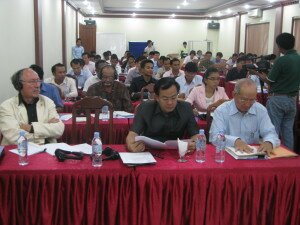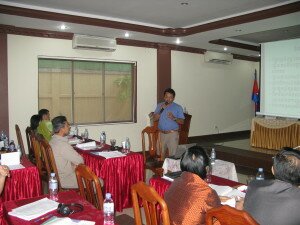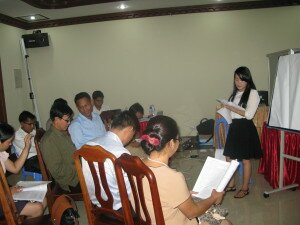
Participants listen during the last consultation workshop on the White Paper on Land Policy
20-21 May 2014
Sihanoukville, Cambodia – “The workshop was a clear success. Therefore, we can go ahead and finalize the draft of the White Paper on Land Policy in the next weeks in order to submit it for approval by the Council of Ministers in the third quarter of 2014,” said Cambodian Secretary of State Lim Voan.
Mr. Voan made this statement in his closing words of the final public consultation workshop on the White Paper on Land Policy in Sihanoukville, thanked all representatives of more than 15 ministries, and an impressive number of NGOs that contributed to workshop discussions.
An achievement for Cambodia, the ‘White Paper’ is internationally seen as the supreme policy on sustainable and just land use and land rights. Additionally, it outlines the government’s direction on land administration and management. In November 2014, the White Paper is planned to be presented by Senior Minister Im Chhun Lim.

Mr. Phann Sithan from NGO-Forum facilitates a group discussion on the White Paper
At this recent workshop, more than 80 experts discussed the White Paper draft for two consecutive days. This draft is a result of five years of consultations and discussions among experts and policy makers. As in previous consultation workshops, GIZ provided flexible moderation, which gave enough time for discussion and group work. As a result, the participants involved themselves actively in the discussions during the full two days. Five years after the approval of the Declaration on Land Policy in 2009, Cambodia will finally have a comprehensive land policy.

Ms. Touch Setha from NGO-Forum facilitates a group discussion
Technical Advisor to the former Council of Land Policy and Land Expert Prof. Dr. Ing. Holger Magel – who provided guidance on the White Paper development during the entire process – underlined in his closing remarks that the White Paper process was itself a model of good governance, thanks to very transparent procedures and broad participation. Regarding the contents and quality of the White Paper, Magel expressed his satisfaction that, in his opinion, all relevant international standards in terms of land governance, and respective land tenure and other rights were intensively discussed and presented. It is expected that this comprehensive land policy will have a far reaching multiplier-effect throughout the country.
As a result, all government agencies, private-sector companies, and the public will receive information on land rights and their responsibilities. There is also no doubt that the White Paper is fundamental for the implementation of Cambodia’s upcoming sustainable development goals.
